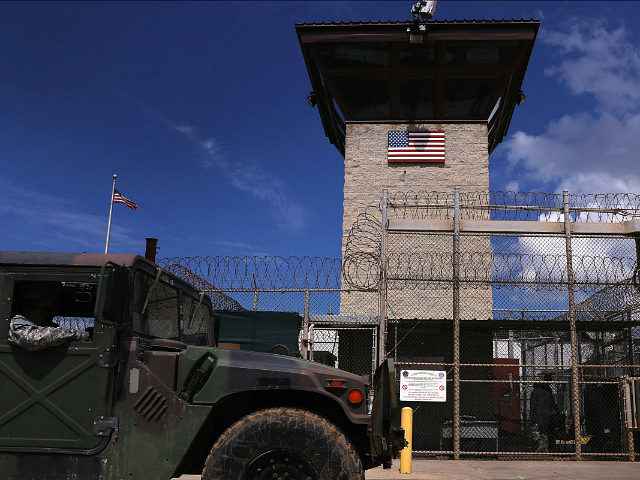Saudi Arabia’s apparent resolve to release up to 13 Yemenis once detained in the American military prison in Guantánamo Bay, Cuba, has reportedly concerned President Donald Trump’s National Security Council (NSC).
Foreign Policy (FP) reports:
Saudi Arabia is quietly preparing to release a group of Yemenis once held in Guantánamo, the first non-Saudis to graduate from its 13-year-old deradicalization program. The imminent release of the nine Yemeni men, however, comes at a tense time for the kingdom and a potentially awkward moment for Washington.
The Yemenis will be freed in Saudi Arabia in the coming days, an official at the Mohammed bin Nayef [MBN] Center for Counseling and Care told Foreign Policy during a visit in late October. Another official confirmed on Friday the men have not yet been released, but will be shortly. Four more Yemenis are slated to leave the rehabilitation facility outside Riyadh in 2018.
Until recently, only Saudi nationals who had already served out their terrorism-linked sentences had been eligible for release as part of the kingdom’s 13-year-old deradicalization program.
FP claims that the Yemeni men slated to be liberated are “the most high-profile graduates yet of the controversial initiative, which is designed to reverse radicalization through a program that offers theological reinstruction, vocational training, art therapy, an indoor lap pool, foosball, off-site vacation, family visits, and, for some, matchmaking.”
The program claims that an estimated 85 percent of its 3,300 graduates have successfully returned to civilian life, staying away from terrorist activities.
In early 2010, deteriorating security conditions prompted former President Barack Obama’s administration to halt the repatriation of Yemeni prisoners held at the Guantánamo facility (commonly known as Gitmo), choosing instead to transfer them to nearby countries, primarily Saudi Arabia.
A civil war has been raging in Yemen since March 2015, when a U.S.-assisted coalition led by Sunni Saudi Arabia launched a military intervention in the Middle Eastern country primarily against the Iranian-backed Shiite Houthi rebels.
U.S. officials fear that releasing jihadists from Gitmo to Yemen would facilitate their return to terrorist activities, ultimately fueling the ongoing war in the country.
As a result, Yemeni nationals make up the largest concentration (14) of the 41 detainees still held at the military prison.
The Trump administration considers Saudi Arabia one of its top allies in the Middle East.
An unnamed spokesperson for the White House National Security Council (NSC) told FP on over the weekend that the United States “remains concerned over former Guantánamo detainees and their potential to engage in future extremist activities, and expects foreign governments to ensure appropriate security measures are in place to prevent such activity.”
FP acknowledges that although Saudi and U.S. officials have allegedly praised the kingdom’s deradicalization program:
Its namesake [Mohammed bin Nayef] has fallen victim to Saudi Arabia’s internal shake-up: Mohammed bin Nayef, the kingdom’s former crown prince and interior minister, was supplanted in June by his cousin Mohammed bin Salman. The new crown prince recently embarked on a purge that has swept aside businessmen and princes tied to the old political order—and the fallout calls into question not only the fate of these Yemeni men, but the program as a whole.
Yahya Abu Maghayd, the director at the deradicalization center, reportedly indicated he is optimistic that Crown Prince Mohammed bin Salman (MBS), who has spearheaded a series of reforms in the country supported by the United States, is fully committed to the program.
Currently, Saudi Arabia’s two jihad rehabilitation centers reportedly hold an estimated 130 men, with the MBN center holding 80, including all the former Gitmo prisoners sent to the kingdom.
According to the latest assessment by the Office of the Director of National Intelligence (ODNI), nearly three out of every 10 Gitmo detainees who had been released (728) as of mid-July 2017 are suspected (90) or confirmed (122) of having returned to terrorist activities.
While most (137) of them remained at large as of mid-July, the remaining ones are either dead (37) or in foreign custody (38).
In 2016, the U.S. officials revealed that jihadists formerly held at Gitmo had killed an estimated half-dozen Americans.
President Trump has not hesitated to express his disdain for the release of Gitmo prisoners, blasting his predecessor for doing so.
Trump vowed to keep the detention center, pledging to “load up” the facility with newly-captured “bad dudes,” a promise that has shown signs of becoming a reality.
In August, the Miami Herald revealed that the U.S. military is planning to spend nearly half a billion dollars on new construction at Gitmo.

COMMENTS
Please let us know if you're having issues with commenting.